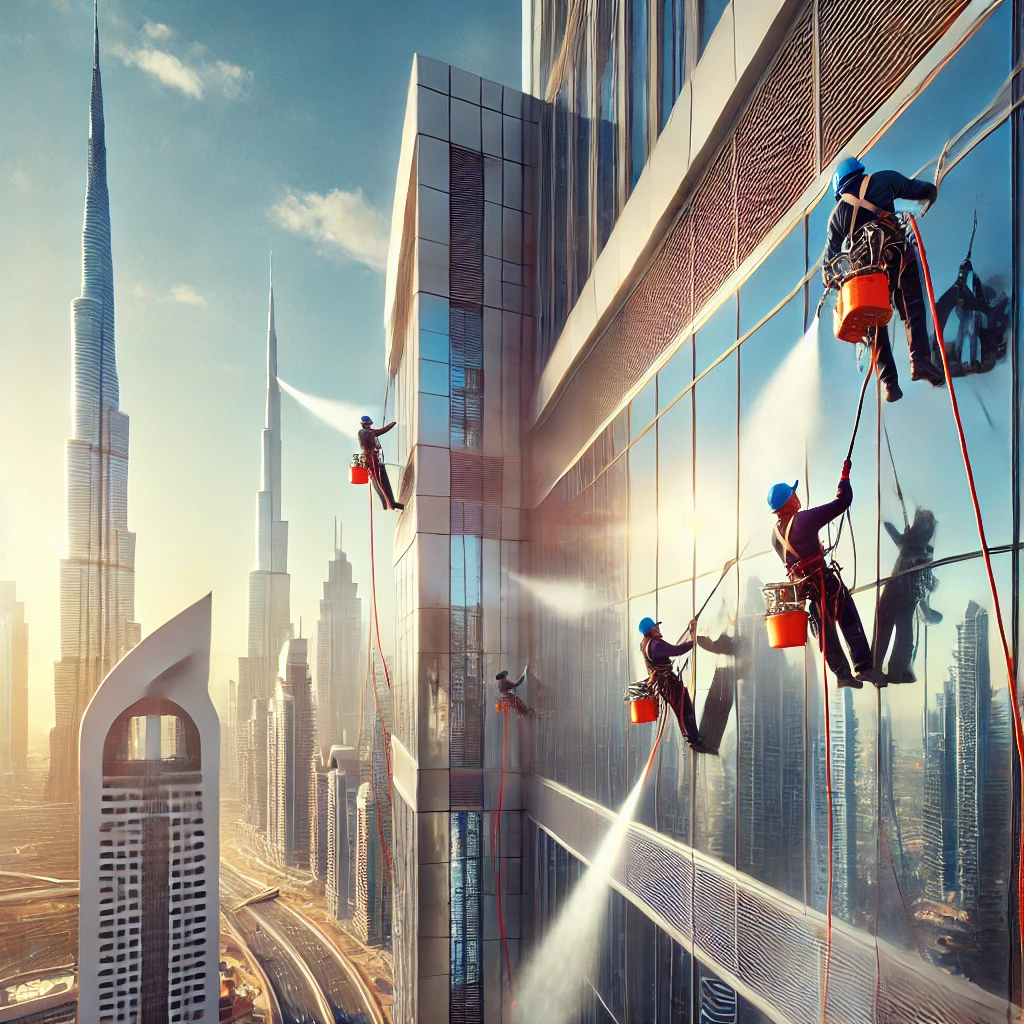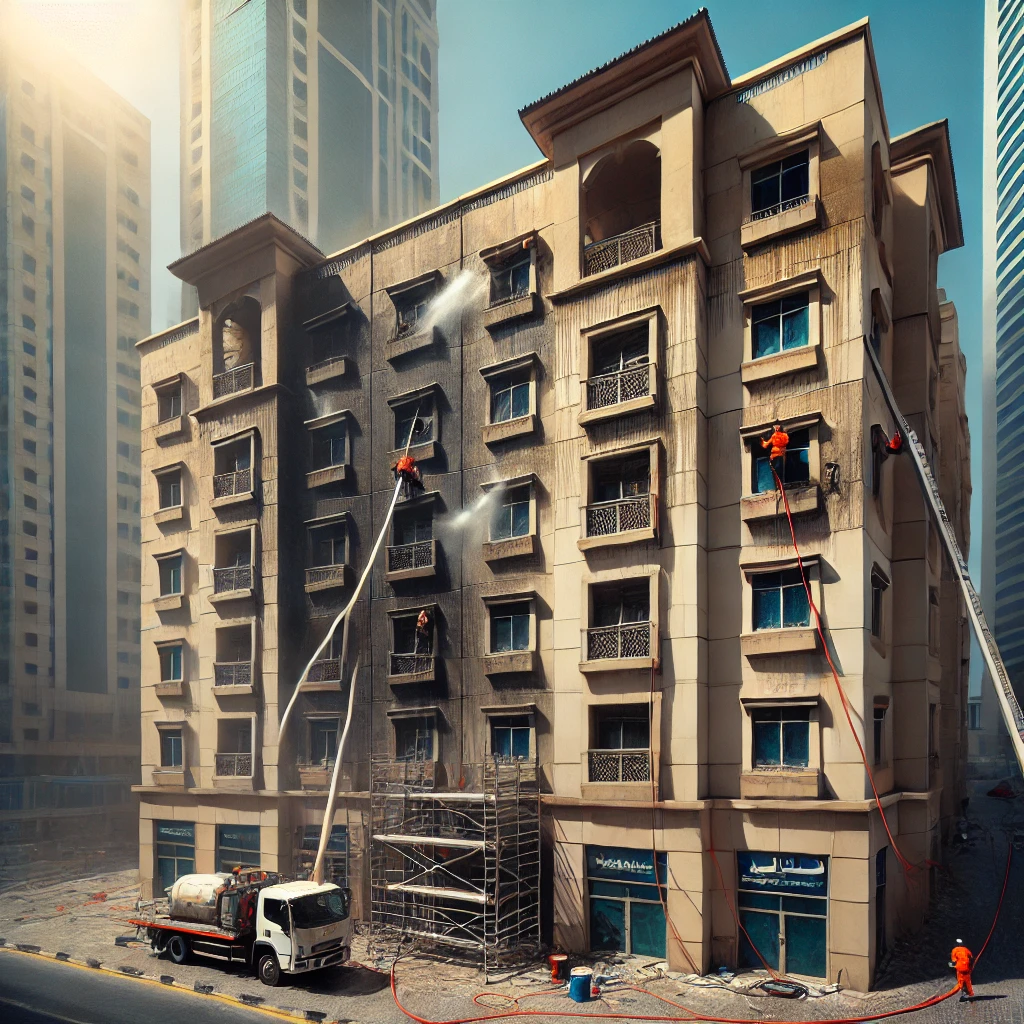Facade Cleaning in dubai for Longevity : Combat Dust & Sun
Understanding Dubai’s Environmental Impact on Buildings
In the vibrant city of Dubai, buildings face a relentless assault from the desert’s harsh conditions. The Environmental Challenges of Dubai’s Climate, including frequent Desert Dust storms and significant Sun Damage, necessitate regular Facade Cleaning to protect and maintain the structural integrity and aesthetic appeal of Commercial Buildings, Residential Buildings, and unique Architectural Structures. This section sets the stage for understanding why facade maintenance is not just about cleanliness but also about Longevity and Damage Prevention.
In Dubai, the marvel of architectural splendor meets the harshness of nature head-on. The city’s buildings, a mixture of modernity and tradition, face the relentless barrage of Desert Dust and Sun Damage. This dual assault accelerates wear and tear, dulls aesthetic appeal, and, over time, can undermine structural integrity. Regular Facade Cleaning in Dubai emerges not as a luxury but a necessity, a vital measure to preserve not just the visual allure but the very essence of Dubai’s architectural achievements.
The Science of Facade Degradation
Exploring the scientific aspects reveals how UV radiation, temperature fluctuations, and particulate matter contribute significantly to the degradation of building exteriors in Arid Regions like Dubai. This part delves into the materials science behind facade wear and tear, emphasizing the need for specialized Exterior Care and Building Maintenance practices to combat these effects. The exteriors of buildings are constantly under attack from environmental factors.
In Dubai, UV radiation and temperature fluctuations combine with particulate matter to create a potent force of degradation. UV radiation, in particular, can break down the chemical bonds in facade materials, causing fading and weakening, while temperature extremes lead to expansion and contraction, stressing materials further. Particulate matter, carried by frequent sandstorms, acts like a sandblaster against surfaces, eroding finishes and even the materials themselves. Understanding this scientific backdrop is crucial for developing effective Cleaning Techniques and Exterior Care strategies that counteract these forces.

Choosing the Right Cleaning Methods for Different Facade Materials
Different facade materials—glass, stone, metal—respond differently to environmental stresses and cleaning methods. This section explores the best practices in selecting the appropriate Cleaning Techniques for each material, ensuring Aesthetic Preservation without compromising the facade’s integrity.
Dubai’s skyline showcases a variety of facade materials, from gleaming glass to traditional stone and modern metals. Each material demands a tailored approach to cleaning; for instance, glass facades require non-abrasive tools and specific cleaning solutions to avoid scratches and residue. Stone, vulnerable to chemical erosion, needs pH-neutral cleaners, while metal facades can benefit from protective coatings to resist corrosion. Selecting the right cleaning methods not only ensures the thorough removal of dirt and pollutants but also guards against inadvertent damage during the cleaning process.
Innovative Cleaning Technologies and Their Benefits
The evolution of Cleaning technologies, including the use of automated drones, robotic systems, and advanced cleaning agents, represents a leap forward in maintaining building exteriors. These innovations offer improved safety, efficiency, and minimal environmental impact, aligning with Sustainable Cleaning Methods and the push towards Advanced Cleaning Technologies.
The frontier of Facade Cleaning in Dubai is marked by innovation, with automated drones, robotic systems, and advanced cleaning agents leading the charge. Drones, equipped with cameras and cleaning tools, can access hard-to-reach areas, providing both assessment and cleaning capabilities without the need for scaffolding. Robotic systems offer precision cleaning across large areas, reducing the time and labor costs associated with manual methods. These technologies not only enhance cleaning efficiency but also prioritize the safety of cleaning crews, minimizing the risks associated with high-altitude work.
Protective Coatings and Treatments for Enhanced Durability
Applying protective coatings is a proactive measure against the Environmental Challenges of Dubai’s Climate. This segment discusses the various types of coatings—anti-dust, UV-protective—and their roles in enhancing the durability and Longevity of facade materials against Desert Dust and Sun Damage. In the battle against Environmental Challenges, protective coatings are an essential armor for building facades. These coatings, designed to repel dust, water, and UV rays, can significantly extend the life of facade materials. For instance, anti-dust treatments reduce the accumulation of sand and dust particles, minimizing maintenance frequency, while UV-protective layers shield against color fading and material degradation. The application of such coatings is a proactive step towards ensuring that buildings not only stay cleaner longer but are also better preserved against the elements.
Water Conservation Strategies in Facade Cleaning
In Dubai’s desert environment, conserving water during facade cleaning is a paramount concern. This section outlines innovative Cleaning Techniques and technologies, such as water recycling systems and dry cleaning methods, that help conserve this precious resource while ensuring effective cleaning. Water scarcity underscores the importance of employing water-conservation techniques in facade cleaning in Dubai. Innovations like water recycling systems, which capture and reuse wastewater, and dry cleaning techniques, which utilize compressed air or absorbent materials, are becoming increasingly prevalent. These approaches not only align with Dubai’s sustainability goals but also offer practical solutions that reduce the environmental footprint of maintaining the city’s iconic buildings.
Regulatory Framework and Best Practices in Dubai
Understanding the regulatory landscape is essential for Property Owners, Facility Managers, and Real Estate Developers. This part covers the local regulations, standards, and certifications that dictate Facade Cleaning in Dubai, ensuring compliance and promoting Best Practices in building maintenance.

Case Studies and Success Stories
Skyline: Pioneering Facade Cleaning in Dubai’s Iconic Skyline
Challenge: The Al Hikma Tower, a 45-story skyscraper in the heart of Dubai, faced significant maintenance challenges due to its intricate glass facade. The building was subject to the relentless sun, causing discoloration and degradation of sealants, and frequent sandstorms that left abrasive dust layers, compromising visibility and the building’s shimmering appearance.
Skyline’s Approach: Recognized for their innovative cleaning solutions, Skyline was tasked with revitalizing the Al Hikma Tower. The company is known for its commitment to sustainability and efficiency, employing advanced technologies and eco-friendly practices in its operations.
Innovative Solutions:
- Automated Drone Technology: Skyline deployed drones equipped with high-resolution cameras for a detailed facade inspection, identifying areas of significant wear and soiling. These drones, controlled by expert operators, were also used to apply non-toxic, biodegradable cleaning agents to targeted areas, minimizing water usage and environmental impact.
- Robotic Cleaning Systems: For the comprehensive cleaning of the facade, Skyline utilized robotic cleaners that could safely navigate the tower’s exterior. These robots used soft, microfiber brushes and a purified water system to gently remove dust and grime without damaging the glass or the building’s sealants.
- Protective Coating Application: Post-cleaning, a protective coating was applied to the facade, designed to repel dust and reduce the adherence of sand particles. This UV-resistant layer also shielded the glass from the sun’s harsh rays, slowing the degradation process and preserving the facade’s integrity and appearance.
Water Conservation Measures: In line with Dubai’s sustainability goals, Skyline implemented water conservation measures throughout the cleaning process. The purified water system used by the robotic cleaners recycled the rinse water, significantly reducing waste. Additionally, the targeted application of cleaning agents via drones minimized the overall volume of water required.
Outcome: The Al Hikma Tower’s facade was restored to its original glory, with improved visibility through its glass panels and a renewed resistance to environmental stresses. The building’s management reported higher tenant satisfaction due to the enhanced natural light and views, alongside a notable decrease in energy costs due to the improved efficiency of the sun-reflective coating.
Client Testimonial: “Skyline’s expertise in facade cleaning has not only rejuvenated the Al Hikma Tower’s appearance but also introduced us to sustainable maintenance practices that align with our values. Their innovative use of technology and commitment to water conservation have set a new standard for building facade cleaning in Dubai,” remarked the facility manager.
Future Trends in Facade cleaning
As technology and environmental concerns continue to evolve, the future of facade cleaning in dubai is likely to see several key trends emerge:
Smart Facades: Integration of smart technologies such as sensors, actuators, and self-cleaning materials will enable facades to monitor their own condition and perform maintenance tasks autonomously. These facades can detect dirt buildup, cracks, or other issues and initiate cleaning or repair processes as needed, reducing the need for manual intervention.
Nanotechnology Solutions: Advancements in nanotechnology will lead to the development of innovative coatings and materials that repel dirt, resist corrosion, and self-heal small damages. These nano-coatings can be applied to facades to enhance durability and reduce the frequency of maintenance required.
Robotics and Drones: Robotics and drones equipped with specialized cleaning tools and cameras will be increasingly used for facade maintenance, especially in high-rise buildings where access is challenging. These automated systems can efficiently clean and inspect facades while minimizing safety risks for workers.
Green Facades: With a growing focus on sustainability, green facades incorporating living plants or vertical gardens will become more popular. These greenery-covered surfaces not only provide insulation and improve air quality but also require regular maintenance to ensure plant health and structural integrity.
Augmented Reality (AR) for Maintenance: AR applications will enable maintenance workers to overlay digital information onto physical facades, facilitating real-time guidance for inspection, repair, and cleaning tasks. This technology can enhance accuracy and efficiency while reducing the risk of errors.
Predictive Maintenance Analytics: Utilizing data analytics and machine learning algorithms, predictive maintenance models will forecast the likelihood of facade issues based on historical data, environmental factors, and structural conditions. This proactive approach allows for timely interventions to prevent costly damage and downtime.
Sustainable Cleaning Practices: There will be a shift towards eco-friendly cleaning solutions and methods that minimize water usage, chemical waste, and environmental impact. Biodegradable detergents, water-efficient cleaning techniques, and renewable energy-powered equipment will become standard practices in facade maintenance.
Collaborative Maintenance Platforms: Online platforms and mobile apps will facilitate collaboration between building owners, facility managers, maintenance providers, and technology vendors for streamlined communication, scheduling, and reporting of facade maintenance activities.
Flexible Facade Designs: Architects and engineers will increasingly prioritize facade designs that are modular, easy to access, and adaptable to changing maintenance requirements. Flexible design solutions will enable efficient maintenance workflows and reduce lifecycle costs.
Regulatory Compliance and Certification: Stricter regulations and certifications related to facade safety, cleanliness, and energy efficiency will drive the adoption of standardized maintenance practices and documentation procedures to ensure compliance and mitigate risks.
By embracing these future trends, the facade cleaning industry can enhance efficiency, sustainability, and safety while prolonging the lifespan of buildings in urban environments.
Read More: Dubai Facade Cleaning: Protect Your Investment, Elevate Your Property’s Appeal
